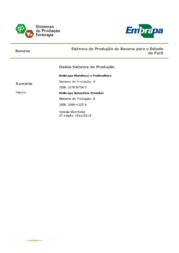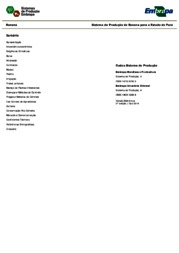Introducing and Evaluating Black-Sigatoka Resistant Banana Trees in the State of Para
Introducing and Evaluating Black-Sigatoka Resistant Banana Trees in the State of Para
Bananas are one of Brazil's main agricultural products, having great economical significance. With a production reaching over five million tons annually, the fruit is a source of food for millions of people around the world. However, the plantations have been facing diseases and plagues which reduce the productive cycle once the local farmers are oblivious to certain agricultural practices. In the Amazon, the need to increase the crops is hindered by the lack of quality genetic strains for dissemination, once the farmers and nursery farmers don't have the habit of growing seedlings for future crops.
Scientifically, the tissue -growing techniques have been allowing the quick dissemination of superior quality strains, both in phytosanitary and vegetative aspects. However, many productive and disease-resistant cultivars developed by research institutes from other regions of the country haven't been tested yet in the soil and weather patterns of Pará.
Considering these facts, this project's goal is to introduce, evaluate, select and disseminate the disease resistant cultivars, enabling the endorsement and planting of this superior quality genetic material in the productive regions of Pará. In addition, the research bolsters the adaptation of the micro-propagation method for these cultivars and furthermore, to make available the seedlings with high productivity and disease tolerance, and overall better market qualities for the rural producers./n
Scientifically, the tissue -growing techniques have been allowing the quick dissemination of superior quality strains, both in phytosanitary and vegetative aspects. However, many productive and disease-resistant cultivars developed by research institutes from other regions of the country haven't been tested yet in the soil and weather patterns of Pará.
Considering these facts, this project's goal is to introduce, evaluate, select and disseminate the disease resistant cultivars, enabling the endorsement and planting of this superior quality genetic material in the productive regions of Pará. In addition, the research bolsters the adaptation of the micro-propagation method for these cultivars and furthermore, to make available the seedlings with high productivity and disease tolerance, and overall better market qualities for the rural producers./n
Ecosystem: Amazonic
Status: Completed Start date: 04/2007 Conclusion date: 03/2009
Head Unit: Embrapa Eastern Amazon
Project leader: Walnice Maria Oliveira do Nascimento
Contact: walnice.nascimento@embrapa.br
Keywords: genótipos, micropropagação, produtividade, sigatoka-negra


